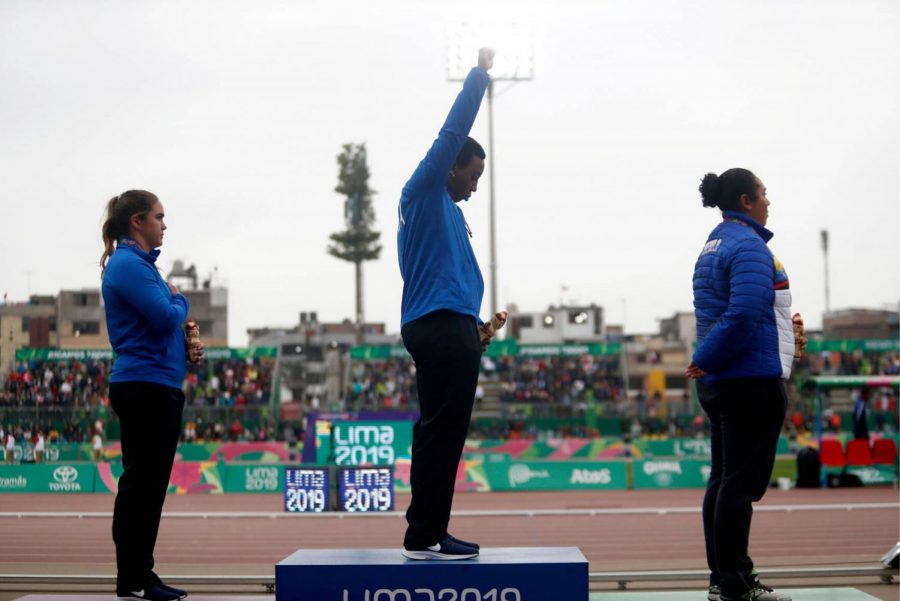Athletes punished for protest at Pan American Games
Team USA hammer thrower Gwen Berry holds her fist in the air during the national anthem after receiving a gold medal at the 2019 PanAm Games in Lima, Peru. As a result, Berry received 12 months of probation.
August 30, 2019
Two American athletes were recently given 12 months of probation for protesting during separate national anthems at the Pan American games in Lima, Peru on Aug. 9. Both athletes remain eligible for the 2020 Olympic Games.
In a letter sent on Tuesday, August 20, United States Olympic & Paralympic Committee (USOPC) CEO Sarah Hirshland sent letters of reprimand to Race Imboden and Gwen Berry. Hirshland talked about rules related to protests such as theirs, and revealed that they would each be receiving 12 months of probation.
“We recognize that we must more clearly define for Team USA athletes what a breach of these rules will mean in the future,” Hirshland wrote in letters whose copies were obtained by the Associated Press. “Working with the [athletes and national governing body councils], we are committed to more explicitly defining what the consequences will be for members of Team USA who protest at future Games.”
Imboden, a foil fencer for Team USA and three-time Pan American champion, took a knee as the national anthem played while receiving his bronze medal as a way to show his opposition towards social injustice in the United States.
“We must call for change,” Imboden said in a tweet the day of the event. “I am honored to represent Team USA at the Pan Am Games…my pride however has been cut short by the multiple shortcomings of the country I hold so dear to my heart.”
In his statement on twitter, Imboden pointed to a handful of issues at the top of his “long list” that he believed needed to be looked into, such as “Racism, Gun Control, mistreatment of immigrants, and a president who spreads hate.”
“I chose to sacrifice my moment today at the top of the podium to call attention to issues that I believe need to be addressed,” Imboden wrote. “I encourage others to please use your platforms for empowerment and change.”
Berry, a Team USA hammer thrower, American record holder, as well as the 2019 PanAm champion, chose to hold up her fist towards the end of the national anthem during her medal ceremony.
“Somebody has to talk about the things that are too uncomfortable to talk about,” Berry told USA TODAY Sports. “Somebody has to stand for all of the injustices that are going on in America and a president who’s making it worse.”
The Pan American Sports Organization, the organizing committee that presides over the PanAm games, implements the same rules that are defined in the Olympic Charter. These rules consist of a ban on any kind of demonstration at its games, Mark Jones, Vice President of Communications, USOPC, explains in a statement on Aug. 9.
“Every athlete competing at the 2019 Pan American Games commits to terms of eligibility, including to refrain from demonstrations that are political in nature. In this case, [Imboden and Berry] didn’t adhere to the commitment [they] made to the organizing committee and the USOPC,” Jones said.
Although the letters sent by Hirshland were addressed specifically to the two American athletes who demonstrated, they also contained non-subtle warnings from the USPOC to athletes participating in the 2020 Olympic Games. Hirshland hinted at harsher consequences in the future to any athletes that may have been inspired by Imboden and Berry to perform similar acts at next year’s Olympic Games.
“It is also important for me to point out that, going forward, issuing a reprimand to other athletes in a similar instance is insufficient,” Hirshland wrote. “We can’t ignore the rules or the reasons they exist.”
Despite this, some students still support athletes in their decision to demonstrate, and feel that what they did was a good way to get their points across.
“I think it’s good for the athletes to use their platform to raise awareness or voice their opinions about politics as long as they don’t get in the way of the actual sport,” Everett Schroeder, sophomore cross country and track runner said. “It’s a good way to voice their opinions because it’s nonviolent and it reaches a large audience.”
As far as punishments go, Schroeder does not agree with the USPOC’s decision to give Imboden and Berry probation for demonstrating. He believes protesting should be the prerogative of the athlete and should not be regulated by the Olympic Committee.
“I don’t think that receiving 12 months of probation was a fair punishment for the athletes,” Schroeder said. “They have the right to freedom of speech and that should be recognized.”







